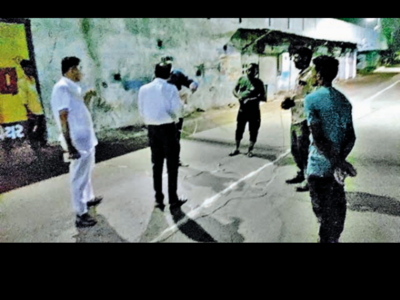- News
- City News
- ahmedabad News
- RTI activist shows flaws, roadblock for contractors in Ahmedabad
RTI activist shows flaws, roadblock for contractors in Ahmedabad

For each road project, the AMC pays a private third-party consultant to inspect these crucial aspects to ensure the longevity of roads
AHMEDABAD: This is a gleaming example of participatory democracy in civic infrastructure projects. Last week, a Kalupur resident was allowed by the Gujarat Information Commission (GIC) under the RTI Act to carry out site inspections of two under-construction road stretches in the city’s central zone.
On Friday, following RTI applicant Pankaj Bhatt’s inspections of the Mohan Cinema to Santoshimata Temple stretch and the Idgah Circle to Nilkanth Awas Yojana stretch, the AMC learnt that road contractors were not using certified instruments. These instruments measure road thickness, the temperature of the hot mix, and weigh the raw materials used for road construction.
The AMC’s engineer asked the contractors to stop construction and to ensure that the Gujarat’s controller for legal metrology provides a certificate for the measuring instruments.
For each road project, the AMC pays a private third-party consultant to inspect these crucial aspects to ensure the longevity of roads. But Bhatt’s inspection highlighted the fact that these essential measuring instruments were being overlooked.
“I was given an opportunity by the GIC and the AMC to exercise my right and participate in the city’s development process through the RTI Act,” Bhatt said. “Citizens should play an active role by filing RTI applications and help the civic body achieve the desired road quality it desires.”
In fact, Bhatt has been allowed to inspect all roads that need resurfacing in the entire central zone in the financial year 2021-22. This is the first such instance of citizen inspection in Gujarat.
In early April, state information commissioner Subhash Soni ordered the AMC to provide Bhatt samples from the fresh batch of materials used in an ongoing road construction project. Bhatt took advantage of the very first section of the RTI Act, which defines Right to Information as the right to inspect “work, documents, records”.
The right also includes taking notes, extracts, or certified copies of civic body documents or records and even taking certified samples of material. The commission had gone a step farther and asked the AMC to provide the RTI applicant a copy of ‘test certificate’ against the material whose sample was provided.
On Friday, following RTI applicant Pankaj Bhatt’s inspections of the Mohan Cinema to Santoshimata Temple stretch and the Idgah Circle to Nilkanth Awas Yojana stretch, the AMC learnt that road contractors were not using certified instruments. These instruments measure road thickness, the temperature of the hot mix, and weigh the raw materials used for road construction.
The AMC’s engineer asked the contractors to stop construction and to ensure that the Gujarat’s controller for legal metrology provides a certificate for the measuring instruments.
For each road project, the AMC pays a private third-party consultant to inspect these crucial aspects to ensure the longevity of roads. But Bhatt’s inspection highlighted the fact that these essential measuring instruments were being overlooked.
“I was given an opportunity by the GIC and the AMC to exercise my right and participate in the city’s development process through the RTI Act,” Bhatt said. “Citizens should play an active role by filing RTI applications and help the civic body achieve the desired road quality it desires.”
In fact, Bhatt has been allowed to inspect all roads that need resurfacing in the entire central zone in the financial year 2021-22. This is the first such instance of citizen inspection in Gujarat.
In early April, state information commissioner Subhash Soni ordered the AMC to provide Bhatt samples from the fresh batch of materials used in an ongoing road construction project. Bhatt took advantage of the very first section of the RTI Act, which defines Right to Information as the right to inspect “work, documents, records”.
The right also includes taking notes, extracts, or certified copies of civic body documents or records and even taking certified samples of material. The commission had gone a step farther and asked the AMC to provide the RTI applicant a copy of ‘test certificate’ against the material whose sample was provided.
FacebookTwitterLinkedinEMail
Start a Conversation
end of article
Quick Links
Delhi Air PollutionDelhi TemperatureChennai WeatherBangalore TemperatureCovid vaccination centres in DelhiCoronavirus in DelhiRTPCR test in GurgaonHyderabad RainPollution level in BangaloreDelhi SmogDelhi TemperatureNoida AQIGurgaon AQI todayFire in MumbaiMumbai RainsCovid 19 RT PCR Test in NoidaDelhi AQI todaySrinagar encounter
